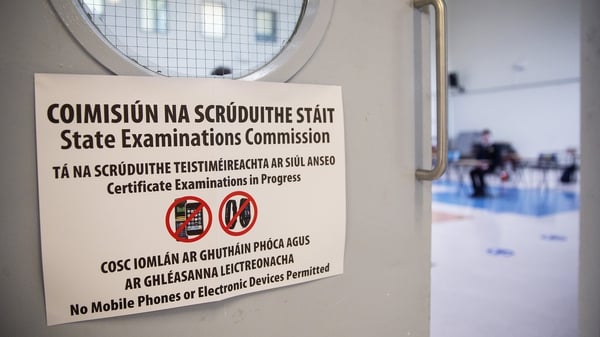The trade union representing school secretaries has said it would be prepared to re-enter Workplace Relations Commission-brokered talks if the Government demonstrates that it is genuinely willing to move off what the union called its rigid commitment to a 40-year-old, two-tier pay system.
Around 1,000 school secretaries are staging a one-day strike, the second such action in their campaign for an end to low pay and insecure working conditions.
The strike follows talks between the trade union Fórsa and the Government at the Workplace Relations Commission, which have so far failed to resolve the dispute.
The secretaries want an end to what they say is a two-tier system that leaves most school secretaries earning just €12,000 a year with irregular short-term contracts that oblige them to sign on during the summer holidays and other school breaks, and leave them without pension and other work entitlements.
Just under 1,000 school secretaries are paid directly by the State, employed by either the Department of Education or State education and training boards.
The remaining estimated 2,000 are employed by schools and paid for out of ancillary grants received by the schools.
Schools say the limited funding provided to them means they cannot afford to pay their secretaries adequately.
Speaking on RTÉ's Today with Sean O'Rourke, Minister for Education Joe McHugh urged school secretaries to return to talks.
In a statement, Fórsa said the Minister had implied that there would be a new flexibility from his department and the Department of Public Expenditure and Reform if talks were to resume.
School secretaries protesting in Waterford @rtenews pic.twitter.com/MxyxMQwo6u
— Conor Kane (@ConorKane0909) January 10, 2020
Today's strike will be followed by a resumption of work-to-rule action, which will see secretaries withdrawing from work on public service systems and databases.

Fórsa said they will refuse to carry out the functions of public servants, because they have repeatedly been refused public service pay and conditions over the last four decades.
The work-to-rule includes a ban on the inputting of payroll information. The Department of Education warned yesterday that the secretaries' actions could impact the payment of teachers and SNAs.
However, a spokesperson also acknowledged that schools were supposed to have other staff who are trained to input this data.
This work-to-rule action was deferred last October in order to allow talks at the WRC to go ahead.
Secretaries will not be placing pickets on schools, but they will rally outside Leinster House and at other locations in Athlone, Letterkenny and Waterford.
Up to 50 school secretaries are protesting outside the constituency office of Minister for Education Joe McHugh in Letterkenny, Co Donegal, where they are calling for equality with counterparts who have public service pay and conditions.

The overwhelming majority of school secretaries are women. Fórsa said it was aware of only two school secretaries who are male.
Andy Pike, the head of Fórsa's Education Division, said the union would go back to the WRC if the Government side was prepared to negotiate a new pay model to end the two-tier system.
He said the existing Department of Education clerical officer pay scale could be used as the starting point.
He also insisted that any resolution must end the lay-off of school secretaries at the end of each school term and introduce basic employment rights like paid holidays and sick leave.
Mr Pike said: "In his media statement yesterday, and in a radio interview today, Minister McHugh seemed to suggest that the Government would move off its rigid position if we were to re-engage at the WRC.
"While this has not been our experience during the talks that took place between October and December, we are prepared to re-engage on this basis, if only to see if there is any real movement on the Government side."
Minister for Education Joe McHugh appealed to Fórsa to defer their action and to re-engage with his department and the Department of Public Expenditure and Reform through the WRC.
He said the two departments were fully open to further dialogue and that this was the only way that the situation would be resolved.






